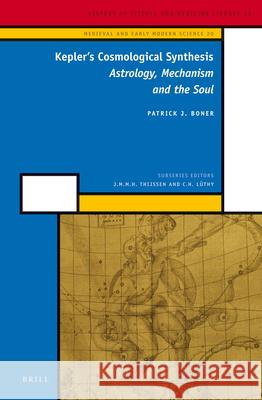Kepler's Cosmological Synthesis: Astrology, Mechanism and the Soul » książka
Kepler's Cosmological Synthesis: Astrology, Mechanism and the Soul
ISBN-13: 9789004246089 / Angielski / Twarda / 2013 / 190 str.
The cosmology of Johannes Kepler remains a mystery. On the one hand, Kepler's speculations on spiritual faculties are seen as the remnants of Renaissance philosophy. On the other, his comparison of the cosmos to a clock summons the mechanical metaphor that shaped modern science. This book explores the inseparable connections between Kepler's vitalistic views and his more enduring accomplishments in astronomy. The key argument is that Kepler's 'celestial biology' served as a bridge between his revolutionary astronomy and other 'less scientific' interests, particularly astrology. Kepler's Cosmological Synthesis sheds new light on one of the foundational figures of the Scientific Revolution. By uncovering a new form of coherence in Kepler's world picture, it traces the unlikely intersections of mechanism and vitalism that transformed the fabric of the heavens. n this important work, historian of science Patrick Boner ably argues against the view of Kepler as an early proponent of the mechanistic universe. The focus on mechanism makes it difficult to understand the place of astrology in Kepler's thought. Dr. Boner develops the concept of Kepler's "vitalistic universe," which describes heavenly bodies in biological terms. This concept becomes the means to integrate Kepler's astronomical and astrological thought. Sheila J. Rabin, Saint Peter's College











